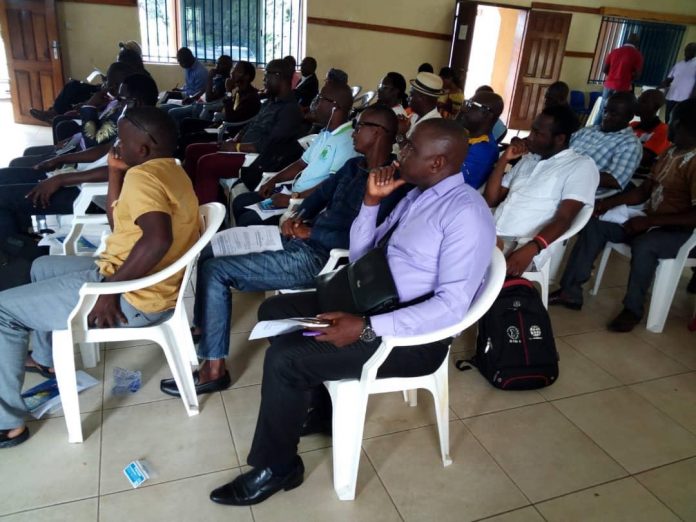By Amin Kef Sesay
The Media Reform Coordinating Group (MRCG)-Sierra Leone, on the 9th December 2020, conducted a one-day training session for media practitioners on the Post Part V Public Order Act, an event which took place at the Trivoli Hall on John Street in the West End of Freetown.
Prior to the proper commencement of the training, the National Coordinator of MRCG, Dr. Francis Sowa stated the exercise marks the beginning of similar training sessions slated to be replicated in the Southern, Eastern and Northern provinces with the cardinal objective of capacitating journalists on what now obtains after the successful repeal of Part V of the Public Order Act of 1965 which, he said, used to criminalize libel and sedition.
He intimated that the training will basically focus on the Freedom of Expression vis-à-vis the Civil Libel Law as well as to examine the IMC Act of 2020 so that at the end of the day journalists will have a proper understanding of what could befall them for practicing unprofessionally in the wake of the transition that took place.
He implored journalists to be attentive, actively participate by asking pertinent questions and make positive comments in order to have an interactive training session.
In his statement, the Chairman of the Guild of Editors, Theo Harding, thanked the MRGC for inviting journalists to what he described to be a very significant training. He underscored that indeed there had been a lot of excitement over the repeal of the obnoxious criminal libel law highlighting that such is expected more so that for far too long journalists suffered imprisonment under the draconian law.
Theo, however, cautioned that with all these excitement journalists must be mindful of the fact that they have a responsibility to raise the profession’s bar high by endeavoring to be professional in news reporting. He admonished all to refrain from gutter journalism and practice according to the tenets of the profession maintaining that it is only by doing so that we can have a free Press in this country and enjoy Freedom of Expression.
Director General of the Sierra Leone Broadcasting Corporation (SLBC), Joseph Egbenda Kapuwa, in a presentation on the topic: “Media Regulation in the Post Criminal Libel Era: The Independent Media Commission Act 2020 and the Civil Libel Law” stated that now that the euphoria that emanated after the repeal process has died down the questions journalists should be asking themselves are how do they regulate themselves after the repeal, why do they ply their trade.
He said individuals choose to practice journalism for various reasons but noted that there is the need for journalists to set themselves apart and rise above pettiness by doing self-regulation. “If journalists do strive to regulate themselves effectively then there will be no need for the existence of laws geared towards regulation,” he averred.
Kapuwa reminded journalists of the fact that as at now the 1965 Public Order Act is still in existence furthering that what took place in Parliament was only a repeal of Part V of the Act which used to criminalize libel and sedition.
He intimated how we also have in existence the Civil Libel Law adding that now that journalists are no longer held under the Criminal Libel Law they could face civil suits in courts of law for any alleged violation.
“Members of the public could file a case in court against any media practitioner if they feel aggrieved that their rights have been violated and the court can institute appropriate punitive measures including the imposition of fines,” he disclosed adding that the right of the court to hear a matter bordering on libel or sedition has not in any way been ousted by the repeal.
Dilating on the IMC Act, Egbenda Kapuwa told participants that over the years various amendments were made to the Act but pointed out that with the new IMC 2020 Act it was not an amendment that was done but a complete change of the entire Act with the incorporation of different provisions. He continued by stating that the essence is to strengthen the IMC.
He said under Section 42 of the IMC Act 2020 media owners are responsible to register with the IMC and in doing so are expected to fulfil certain benchmarks such as paying staff salaries in line with the minimum wage, payment of taxes to the National Revenue Authority (NRA), payment of NASSIT fees etc which he underpinned as statutory obligations.
After taking participants through certain aspects of the Act, he then highlighted that there is provision in the very Act that if media practitioners are not satisfied with decisions reached at by the IMC with regards arbitration then they can seek redress in the Judiciary.
Climaxing the training session was a question and answer session.




